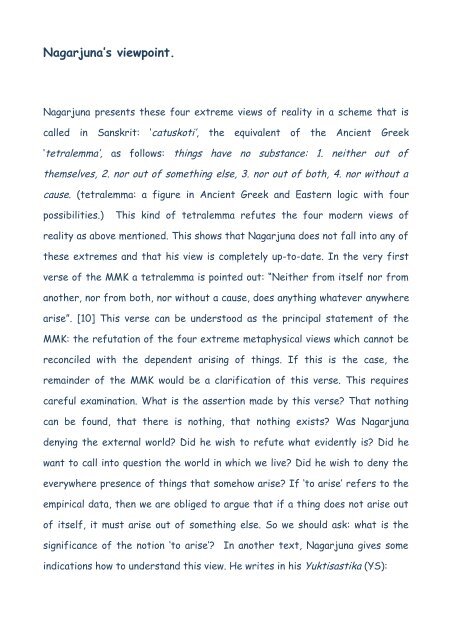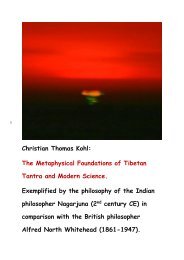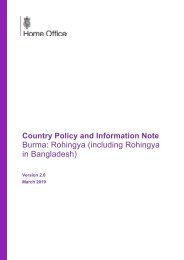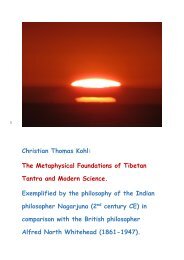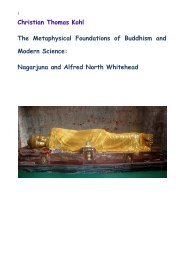Christian Thomas Kohl The Metaphysical Foundations of Buddhism and Modern Science
Christian Thomas Kohl The Metaphysical Foundations of Buddhism and Modern Science
Christian Thomas Kohl The Metaphysical Foundations of Buddhism and Modern Science
You also want an ePaper? Increase the reach of your titles
YUMPU automatically turns print PDFs into web optimized ePapers that Google loves.
Nagarjuna’s viewpoint.<br />
Nagarjuna presents these four extreme views <strong>of</strong> reality in a scheme that is<br />
called in Sanskrit: ‘catuskoti’, the equivalent <strong>of</strong> the Ancient Greek<br />
‘tetralemma’, as follows: things have no substance: 1. neither out <strong>of</strong><br />
themselves, 2. nor out <strong>of</strong> something else, 3. nor out <strong>of</strong> both, 4. nor without a<br />
cause. (tetralemma: a figure in Ancient Greek <strong>and</strong> Eastern logic with four<br />
possibilities.)<br />
This kind <strong>of</strong> tetralemma refutes the four modern views <strong>of</strong><br />
reality as above mentioned. This shows that Nagarjuna does not fall into any <strong>of</strong><br />
these extremes <strong>and</strong> that his view is completely up-to-date. In the very first<br />
verse <strong>of</strong> the MMK a tetralemma is pointed out: “Neither from itself nor from<br />
another, nor from both, nor without a cause, does anything whatever anywhere<br />
arise”. [10] This verse can be understood as the principal statement <strong>of</strong> the<br />
MMK: the refutation <strong>of</strong> the four extreme metaphysical views which cannot be<br />
reconciled with the dependent arising <strong>of</strong> things. If this is the case, the<br />
remainder <strong>of</strong> the MMK would be a clarification <strong>of</strong> this verse. This requires<br />
careful examination. What is the assertion made by this verse? That nothing<br />
can be found, that there is nothing, that nothing exists? Was Nagarjuna<br />
denying the external world? Did he wish to refute what evidently is? Did he<br />
want to call into question the world in which we live? Did he wish to deny the<br />
everywhere presence <strong>of</strong> things that somehow arise? If ‘to arise’ refers to the<br />
empirical data, then we are obliged to argue that if a thing does not arise out<br />
<strong>of</strong> itself, it must arise out <strong>of</strong> something else. So we should ask: what is the<br />
significance <strong>of</strong> the notion ‘to arise’? In another text, Nagarjuna gives some<br />
indications how to underst<strong>and</strong> this view. He writes in his Yuktisastika (YS):


